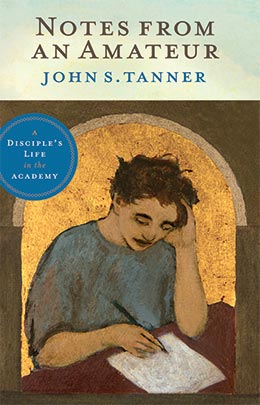Acceptable Sacrifice
John S. Tanner, Notes from an Ameteur: A Disciple’s Life in the Academy (Provo, UT: Religious Studies Center; Salt Lake City: Deseret Book, 2011), 34–6.
I take comfort and hope in a distinctive doctrine of Mormonism. It is what I call the doctrine of the acceptable sacrifice. This doctrine is embedded in our history as well as in God’s dealings with his people throughout history. No doubt the Lord knew that those whom he would command to be perfect even as he is perfect would struggle with perfectionism. So he also revealed a doctrine adjusted to a celestial calculus of limits, in which human performance is inherently limited while divine demands for perfection is inherently limitless. The doctrine of the acceptable sacrifice reminds us that the Lord does not require us to succeed. He requires us to try. As T. S. Eliot wrote, “For us, there is only the trying. / The rest is not our business.” [1] As we offer our best efforts to God, he can declare those efforts acceptable even when this means graciously taking the intent for the deed.
The Saints were taught this lesson many times in the Doctrine and Covenants, especially in response to their failure to establish Zion in Missouri (e.g., 105:19; 124:49–51; 132:50). Interestingly, the Latter-day Saints were not without fault for this failure (cf. D&C 101:6–7). Yet ultimately the Lord still accepted their offering. There is hope in this for all of us who try as well as we know how, but also know how far short of perfection we inevitably fall. The Lord doesn’t require that we reach perfection, only that we strive for it. By his grace he makes up the difference between our finite efforts and his infinite expectations.
When I think of the gracious doctrine of acceptable sacrifice, I remember a moving lyric by my favorite devotional poet, George Herbert, and Milton’s depiction near the end of Paradise Lost of Adam and Eve’s sacrifice after the Fall. Both these works provide imaginative treatments of the doctrine that we are saved by grace after all we can do.
In “Love (III),” the poet imagines his soul’s entrance into heaven as that of a guest coming into an inn at the end of a long journey, feeling “guilty of dust and sin.” The guest is embarrassed when his host, whom he calls Love, offers to serve him. He wants to hide from or at least be allowed to serve his host. Ultimately, however, the reluctant guest has to allow himself to be served by the host and “taste my meat.” The Eucharistic symbolism recalls another kind of meat and another kind of host. The poem ends with one of the simplest but, in context, most moving exchanges in literature:
“You must sit down,” says Love, “and taste my meat.
So I did sit and eat. [2]
Milton depicts a similar interplay between human agency and divine grace in the sacrifice offered by Adam and Eve after their transgression. The smoke of their burnt offering along with their heartfelt prayers of repentance rise to heaven, where the Son, as Advocate, brings them to the presence of the Father, saying:
Now therefore bend thine ear
To supplication, hear his sighs though mute;
Unskilful with what words to pray, let me
Interpret for him, me his Advocate
And propitiation, all his works on me
Good or not good engraft, my Merit those
Shall perfect, and for these my Death shall pay.
Accept me, and in me from these receive
The smell of peace toward Mankind. [3]
The scene is very much like the sublime dialogue between the Father and Son described in Doctrine and Covenants 45:3–5. All of us depend on the intercession of such an Advocate, whose infinite sacrifice is required to render our finite sacrifices acceptable.
As I end my assignment as academic vice president, I take solace in the great LDS doctrine of acceptable sacrifice. None of us is perfect, but we can all do our best. The watchword of this administration has been President Gordon B. Hinckley’s charge to President Cecil O. Samuelson that he should make BYU the best it can be. To this end each of us is expected to lay on the altar our best effort, our very best—the firstlings of our hearts, hands, and minds. I am persuaded.
Notes
[1] T.S. Eliot, The Four Quartets, “East Coker,” line 189 (New York: Harcourt, Brace, & World, 1971), 31.
[2] George Herbert, “Love (III),” lines 17–18, The Selected Poetry of George Herbert, ed. Joseph H. Summers (New York: New American Library, 1967), 255.
[3] John Milton, Paradise Lost, book 11, lines 30–38, in The Complete Poetry and Essential Prose of John Milton, ed. William Kerrigan, John Rumrich, and Stephen M. Fallon (New York: Random House, 2007), 586.
